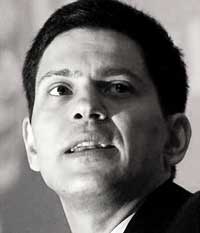The Mac is back
Martin Kettle is in the US covering the New Hampshire primaries and has just produced this insightful piece on the guy who will turn out to be the tragic hero of this election: John McCain.
There’s also an intriguing video of Suzanne Goldenberg exploring the paranoia and control-freakery now surfacing in the Obama camp.
So what does that Obama victory mean, exactly?
Nice acerbic piece by Gary Yonge, contrasting Barack Obama with those great black hopes of yesteryear, Jesse Jackson and Al Sharpton.
By the time Obama came of age, there was no civil rights movement to emerge from and few union halls to go to. But thanks to the gains of the civil rights era he could attend the nation’s best universities (Columbia and Harvard) and get a fantastic job. With no roots in the black politics – the soil was too barren for anything beyond community organising – he emerged from academe. Politically speaking, he was not produced by the black community, but presented to it.
In this respect, Obama shares a great deal with a number of black politicians of his generation who have come to the fore in recent years. Among them are the Massachusetts governor, Deval Patrick (Harvard); the Newark mayor, Cory Booker (Yale); the Democratic Leadership Council chair and former Tennessee congressman, Harold Ford Jr (University of Pennsylvania); and the Maryland lieutenant governor, Anthony Brown (Harvard). Obama’s trajectory is not the rule; but nowadays it is by no means an exception.
In most of Obama’s rhetoric, Yonge muses, “race is virtually absent from his message but central to his meaning. He doesn’t have to bring it up because not only does he espouse change, he looks like change. He has the role of an inadequate and ineffective balm on the long-running sore that is race in America. His victory would symbolise a great deal and change very little.”
Thanks to Pete for the link.
Reckoning the odds
Dick Cheney famously warned in the context of terrorism that if there is even a one per cent of something very bad happening, we should act as though it were a certainty. Since the odds are approaching 100 per cent that if humankind continues to pump greenhouse gases into the atmosphere, it will alter the planet in ways that no one can predict, Cheney’s rule should make him, on the subject of climate change, a soulmate of Al Gore.
Strobe Talbott, President of the Brookings Institution, writing in the Financial Times, January 5/6, 2008.
Twilight of the Clintons?
The best and most revealing television coverage of the US Primaries this time isn’t coming from the TV networks, but from newspapers. See, for example, this extraordinarily revealing video report of Hillary Clinton’s first day in New Hampshire. It comes from the Guardian, not the BBC. It reinforces what Roy Greenslade discovered (see previous post).
The digital journey: how British newspapers are adapting to the online challenge
Typically thoughtful report by Roy Greenslade, who has been round the editorial floors of the Telegraph, Financial Times and Times.
In a sense, the online revolution is like a train journey without a destination. As soon as one paper arrives at a station that had once appeared to be a terminus, another title has built a new line and sped onwards. Despite the differences, everyone seems clear about the general direction to take towards an otherwise mysterious objective: the future of news-gathering and news delivery is tied to the screen.
For the moment, given the need to keep on printing while simultaneously uploading, it means driving as fast as possible towards a brave new world while keeping the engines running at full power in the old – but still lucrative and popular – world of newsprint.
Inevitably, this split has proved uncomfortable, both in journalistic terms and, seen from the perspective of owners and managers, in financial terms too. In company with editors, they have set the course to reach a single station named “Integration”. It is now clear that the days of binary staffing, with journalists for print and journalists for web, are virtually over. In most offices the initial scepticism about the utility and viability of online news has long since passed…
Spring is sprung…

… apparently. Well, on our kitchen window-sill anyway. Note tasteful background of dirty glass.
Churchill and Hitler as you never saw them before
Intriguing PhotoShopping by Daniel Eatock.
The Daley version
Janet Daley, writing in the Telegraph…
Maybe I am allowing the fleeting excitement of the moment, and the splendid theatre of this very surprising week, to carry me into fanciful territory. If so, I may as well continue along this harebrained path and do what nobody but a giddy fool would be prepared to risk at this juncture. I will make some predictions about the presidential race. First, a relatively safe one: Barack Obama will become the Democratic nominee. His party will not be able to bring itself to turn down the possibility of choosing the first black presidential candidate, when he is so clearly able and charismatic. To reject him would seem to be cowardly and reactionary. (One observation I have not heard anyone make is that Hillary has lost a major Clinton advantage: her husband was far and away the most popular candidate with black voters in the North and the South. Now those voters have one of their own to support so they do not need Bill-by-other-means.) Obama will then choose a considerably older, more seasoned vice-presidential running mate (but not Hillary) in an attempt to counter his lack of experience…
She doesn’t think he’ll be President, though.
The mother-in-law for Foreign Affairs

I was idly browsing and came on this picture of David Miliband and wondered if he was the youngest Foreign Secretary ever. He has amazing hair — like astroturf that’s been sprayed jet black. Will it go grey as the strains of office multiply?
And then I came on this passage in Janet Flanner’s New Yorker dispatch from Paris for June 23, 1948:
The most worried, wearied, unthanked, and necessary public servant in any government today is its Minister for Foreign Affairs. He is like a mother-in-law — in the bosom of the family, yet not of it. Essentially, he is related to a world outside, a go-between harried by what the family thinks is its due and by what the neighbours say it deserves, which is invariably a lot less.
She was writing about Georges Bidault, the French Foreign Minister of the time, but her observation is generalisable. For example: As Prime Minister, Margaret Thatcher was pathologically suspicious of the Foreign Office. Just as the Ministry of Agriculture was effectively the ministry for farmers, she reasoned, so the Foreign Office was the ministry for foreigners, and so she installed her own policy advisers in Number 10 and ran an independent foreign policy from there. Gordon Brown is also a control freak, so perhaps it is legitimate to worry about young Miliband’s hair.
